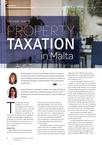
The Maze that is Property Taxation in Malta
Whereas recent regulatory changes have attempted to simplify one’s obligations one must still understand what are the underlying fiscal implications. This article is an attempt to provide clarity on such obligations (May 2015).
Income Tax
Before determining the tax treatment of rental income, one would have to look at the nature of the rental income and understand whether such rental income is considered to be active business profits, or passive income. Distinguishing between active (rental constitutes a business line and rents thus short-term rentals) and passive (whereby rentals are of a long-term nature) business lines may at times be difficult, yet such distinction is important given that the applicable deductions under the two scenarios differ.
The deductions that one can take against rental income which is treated as active business profits are those which are wholly and exclusively incurred in the production of income. On the other hand, there are limited deductions (prescribed through a Legal Notice) that one can take against the rental income which is considered to be derived from a passive source.
A recent amendment to the Income Tax Act gives an option to lessors to charge their rental income at a final flat tax rate of 15% of gross rental income. However such an option can only be taken up by lessors of properties used as residential tenements for which a license under the Malta Travel and Tourism Services Act is not required. This option can be taken on an annual basis, and once it is taken, it has to be applied on all the rents received from letting residential tenements in that particular year. This option is taken up by completing a specific form and paying the resulting tax by the 30th June following the year in which the rental income is received.
Other reduced tax rates also apply in exceptional cases, such as for example a 5% tax rate on the receipt of rental income from the Housing Authority. A recent introduction to the Income Tax Act provides for a one time possibility for lessors to regularise their position with respect to undeclared rental income. This possibility is open for rentals which ought to have been declared in the eight years spanning between 2005 and 2012.
The tax charge on such rental income would be 15% of double the average of the rental income received between these eight years. This opportunity can be taken up by filling up a specific form and the resulting tax is paid by 30th June 2015.
Value Added Tax
From a VAT perspective, as a general rule, the renting of immovable property is classified as an ‘exempt without credit’ supply, meaning that Maltese VAT is not due on the said supply and the lessor would not have the right to claim any VAT incurred on his/her purchases made in connection with the rental property.
Two of the exceptions to this rule are:
- "The letting of or the provision of accommodation in any premises which for the purpose of the said letting or accommodation is required to be licensed in virtue of the Malta Travel and Tourism Services Act”; and
- The leasing of property by a limited liability company to a person who is registered under Article 10 of the VAT Act for the purpose of that person’s economic activity. When it comes to the first exception, the word ‘required to be licensed’ is of significant importance as it entails that liability to charge VAT does not depend on whether or not the lessor is actually in possession of an MTA license but on whether an MTA license is required.
The Malta Travel and Tourism Services Act, stipulates that an MTA license is required to operate a holiday premises providing accommodation to tourists. In accordance with the laws currently in place, a “tourist” means any person who travels to a place other than that of his usual environment for less than 12 months and who stays at least one night in the place visited. Notwithstanding the above, the leasing of property to a person who has not been in Malta for 12 months but who is in Malta purely for business purposes is not considered as licensable activity by the Malta Tourism Authority.
Leases falling within the ambit of this exception relating to the provision of accommodation requiring an MTA license are chargeable to VAT at the reduced rate of 7% and the lessor would have a right to claim VAT incurred on purchases intended to be wholly used in the course or furtherance of this leasing activity, insofar as the lessor’s supplies remain taxable. When the status of a supply changes from taxable to exempt without credit for VAT purposes (for example, once the lessee has been in Malta for a 12 month period) and VAT would have been claimed on certain capital goods (goods where the price, or open market value, is at least €1,160), an adjustment may need to be made in favour of the VAT Department.
The second exception to the general exemption relates to the renting of property by a limited liability company to a person registered in terms of article 10 of the VAT Act for the purpose of that person’s economic activity. The VAT rate in such a case would generally be 18%.
It is also important to note that, in the event that the lease is subject to VAT under these two mentioned exceptions however the lessors turnover over a 12 month period does not exceed €14,000, such lessors may apply to be registered for VAT purposes as small undertakings (in terms of article 11 of the VAT Act) and would not require to charge VAT on the lease of their property whilst not being in a position to claim VAT incurred on their purchases. Understanding the above provisions is critical not only to move through the maze that is property taxation, but also to avoid incurring non-compliance fiscal fines and penal interest. Seeking suitable professional advice is always recommended.
This article first appeared in the Belair Preview Property Magazine in May 2015.

